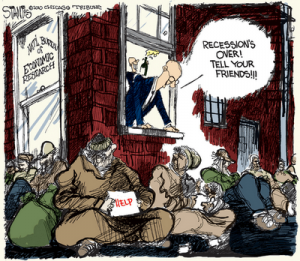Latest Posts
Time to Break Up the Too-Big-To-Fail Banks?
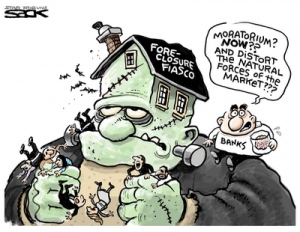 In January of 2009, I wrote a post called “Default Option.” My outrageous plan was to simply let the banks fail. Some people told me that was an unthinkable way to handle the financial meltdown, but I still think otherwise. Yes, it would have been rough. Bondholders and shareholders would have been wiped out, unemployment would have shot up, and lots of people would have lost money. Back then, I wrote, “In short, the incompetent banks would be liquidated and competent banks would take over the assets that are left behind. (more…)
In January of 2009, I wrote a post called “Default Option.” My outrageous plan was to simply let the banks fail. Some people told me that was an unthinkable way to handle the financial meltdown, but I still think otherwise. Yes, it would have been rough. Bondholders and shareholders would have been wiped out, unemployment would have shot up, and lots of people would have lost money. Back then, I wrote, “In short, the incompetent banks would be liquidated and competent banks would take over the assets that are left behind. (more…)
Who Really Owns Your Home?
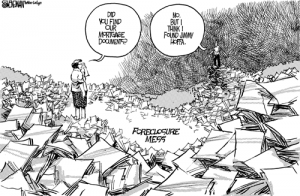 By Greg Hunter’s USAWatchdog.com
By Greg Hunter’s USAWatchdog.com
There are some big questions facing the real estate market after the foreclosure fraud story exploded in the last few weeks. The number one question for anyone who has a mortgage is “Who really owns your home?” This would be simple to answer before the mortgage-backed security (MBS). These MBS’s were mortgages that were bundled together and sold to investors such as pension and bond funds by big banks. (more…)
Could a Dollar Crash Be Coming Soon?
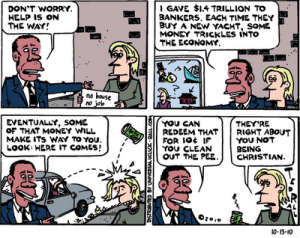 By Greg Hunter’s USAWatchdog.com
By Greg Hunter’s USAWatchdog.com
It’s official. The economy is in trouble. The Fed seems to be hitting the panic button and is sending numerous clear signals that it will print more money to push up the economy. The Fed has already printed $1.7 trillion to buy mortgage-backed securities in the past year or so. New money printing (Quantitative Easing) will be done to buy U.S. Treasuries, or America’s own debt. (more…)
Bank Shot
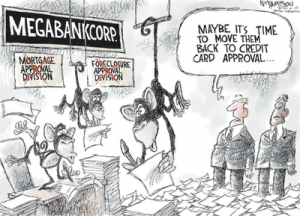 What a week for real estate! The mortgage document fraud investigation kicked into high gear with all 50 state attorneys general opening investigations. There are calls for criminal investigations, and trial attorneys smell blood over allegations of fraud many say will be easy to prove. (more…)
What a week for real estate! The mortgage document fraud investigation kicked into high gear with all 50 state attorneys general opening investigations. There are calls for criminal investigations, and trial attorneys smell blood over allegations of fraud many say will be easy to prove. (more…)
Fear, Desperation and Doom Describe the Housing Market
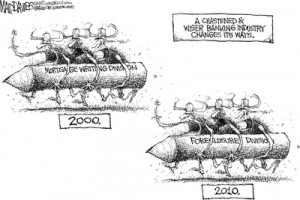 By Greg Hunter’s USAWatchdog.com
By Greg Hunter’s USAWatchdog.com
It has been called foreclosure gate, robo signing, foreclosure fraud or just sloppy paperwork; but no matter what you call it, it’s signaling a new financial meltdown for the U.S. economy. The securitized mortgage debt created in the real estate bubble is being called the “largest fraud in the history of capital markets” by people like renowned gold expert Jim Sinclair.
What is Happening Now and Where are We Going?
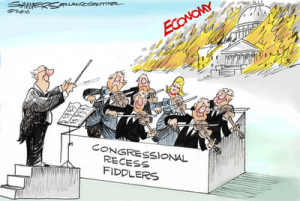 By Greg Hunter’s USAWatchdog.com
By Greg Hunter’s USAWatchdog.com
Gerald Celente is the founder of The Trends Research Institute. He’s been forecasting future trends since 1980. Today’s financial economic and political climate is volatile and unpredictable for most of us, but not Celente. He has made many correct predictions over the past 3 decades. Some of his more recent predictions include the panic and meltdown of 2008, and he says the “Collapse of 2010” is well underway. (more…)
Did Congress try to Legalize Foreclosure Fraud?
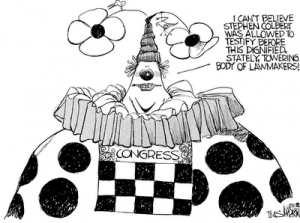 By Greg Hunter’s USAWatchdog.com
By Greg Hunter’s USAWatchdog.com
A bill that will make it more difficult to challenge improper foreclosure is going to be Vetoed by President Obama according to a Wall Street Journal story. The bill quietly slipped through the Senate last week with a unanimous vote. (The House passed the bill in April.) There was no public debate. No one spoke up for the people fraudulently foreclosed on by big banks. The bill got through because of a special Senatorial procedure. Both Democratic and Republican leaders thought it was a good idea to make it harder for the average homeowner to fight the banks in foreclosure. (more…)
Record High Gold all about Fear
 By Greg Hunter’s USAWatchdog.com
By Greg Hunter’s USAWatchdog.com
There has been one record high after another for gold. They say the markets are ruled by fear and greed. In this case, it is simply fear that is driving the yellow metal higher day after day. There is a perfect storm of doom in the economy right now. The biggest problem is debt. It just went parabolic with the revelation that the banks are stuck with trillions of dollars in worthless mortgage backed securities. I wrote all about this Monday in a post called “Could Foreclosure Fraud Cause a Banking Calamity?” The U.S. government is going to come to the rescue and bailout the banks once again. (more…)
Could Foreclosure Fraud Cause Another Banking Meltdown?
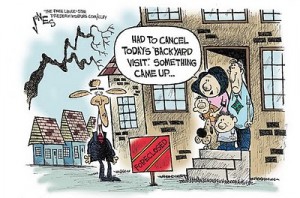 By Greg Hunter’s USAWatchdog.com
By Greg Hunter’s USAWatchdog.com
This weekend, Bank of America became the latest lender to delay all foreclosures in 23 states because of possible problems with the necessary documents needed to repossess a home. GMAC Mortgage and JP Morgan Chase have had similar problems recently with documents that prove the bank has the right to foreclose. (more…)
The Fallacy of ‘Bailing Out’ U.S. Cities and States
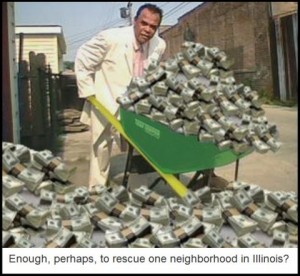 I want to revisit something banking analyst Meredith Whitney said this week on CNBC about the huge financial insolvency problems facing many U.S. states. She said, “You have to look at the states and the risk that the states pose, because the crisis with the states will result in an attempt at least for the third near-trillion-dollar bailout.” I feel there is no way Whitney reveals this possible $1,000 billion boondoggle unless she has some inside information or insight. This is a lose-lose proposition. (more…)
I want to revisit something banking analyst Meredith Whitney said this week on CNBC about the huge financial insolvency problems facing many U.S. states. She said, “You have to look at the states and the risk that the states pose, because the crisis with the states will result in an attempt at least for the third near-trillion-dollar bailout.” I feel there is no way Whitney reveals this possible $1,000 billion boondoggle unless she has some inside information or insight. This is a lose-lose proposition. (more…)
When Meredith Speaks, You Should Listen
 By Greg Hunter’s USAWatchdog.com
By Greg Hunter’s USAWatchdog.com
I was pulling up to a store yesterday in my car, listening to CNBC on XM Radio, when an interview with banking analyst Meredith Whitney came on as a guest. I shut the car off and listened because, over the years, I have learned when Whitney talks, everybody should pay attention. There are only two reasons why I think this way: (1) Whitney has a track record of many good calls on the economy and banking. (2) Her predictions are usually spot on.
Recession Not Over, Double-Dip or Worse Coming
Just last week, I ridiculed a group of academic economists for calling an end to the longest recession since World War II. The National Bureau of Economic Research proclaimed the recession we STILL find ourselves in ended in June of 2009. The NBER is the official arbiter of the timing of the U.S. business cycle. Well, I’m not the only person who thinks the NBER’s ascertainment of the economy defies all statistical evidence. (more…)
Is Gold in a Bubble?
 By Greg Hunter’s USAWatchdog.com
By Greg Hunter’s USAWatchdog.com
With gold hitting all time nominal highs this week, the recurring question is “Is gold in a bubble?” The yellow metal has been flirting with the $1,300 an ounce mark, and some folks are getting a little worried it has gone too far too fast. If anything, gold has not gone far or fast enough if you compare it to the U.S. debt and future commitments. According to Boston University economics professor Laurence Kotlikoff, the U.S. is “bankrupt.” (more…)
The Recession is Over? Really!
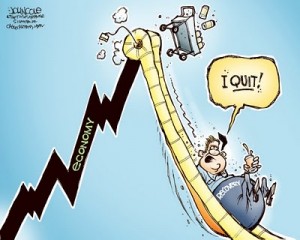 By Greg Hunter’s USAWatchdog.com
By Greg Hunter’s USAWatchdog.com
I was dumbfounded by the headline “Recession Ended in June 2009” that came out earlier this week. The National Bureau of Economic Research (NBER), which is a panel of academic economists, called an end to the longest recession since WWII. (more…)
We Don’t Have Honest Money
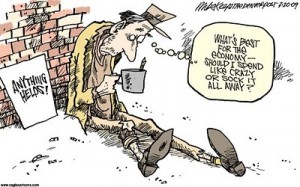 By Greg Hunter’s USAWatchdog.com
By Greg Hunter’s USAWatchdog.com
My nephew, Luke, called me the other day vexing over the materials used in our coins. He is a finance major in grad school and was researching money when he discovered that pennies were 97.5 percent zinc and nickels were mostly copper with only a nickel coating. (more…)

